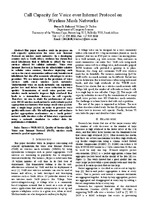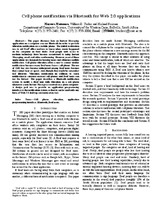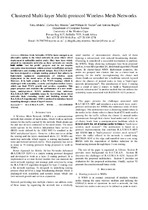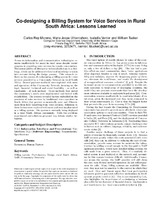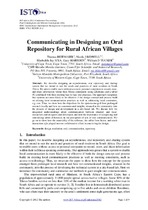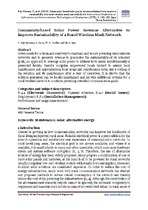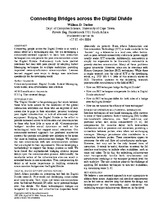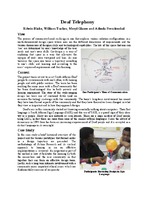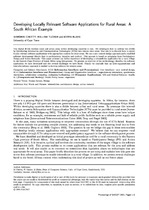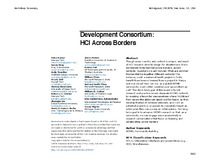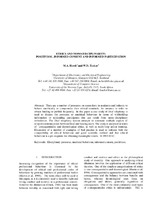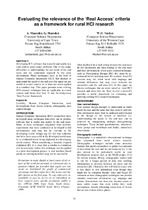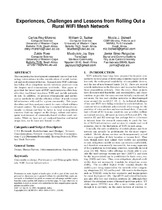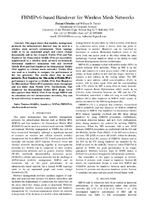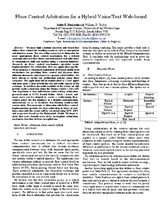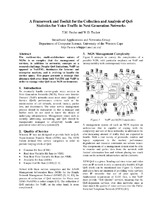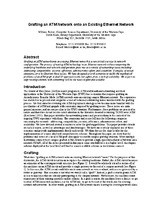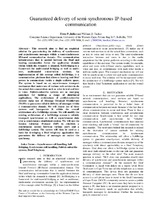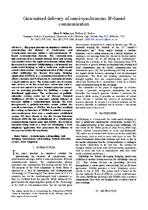Browsing Prof. William Tucker by Title
Now showing items 13-32 of 89
-
Call capacity for voice over Internet Protocol on wireless mesh networks
(Telkom, 2010)This paper describes work in progress on call capacity optimization for voice over Internet Protocol on wireless mesh networks. In a developing country such as South Africa, evidence has shown that rural inhabitants find ... -
Cell phone notification via bluetooth for Web 2.0 applications
(Telkom, 2009)This paper discusses how an Instant Messaging application on a computer can use Bluetooth in order to provide vibration notification on a mobile phone. The initial motivation was to aid Deaf1 office workers to know when ... -
Clustered Multi-layer Multi-protocol Wireless Mesh Networks
(Telkom, 2015)Wireless Mesh Networks (WMNs) have emerged as an alternative option to the wired networks in areas where wired deployment is unfeasible and/or costly. They have been widely adopted in community networks as these networks ... -
Co-designing a billing system for voice services in rural South Africa: Lessons learned
(ACM, 2014)Access to information and communication technologies re- mains una ordable for many in rural areas despite recent progress in providing voice services to remote communities. The sustainability of alternative technical ... -
Communicating in designing an oral repository for rural African villages
(IIMC International Information Management Corporation, 2012)We describe designing an asynchronous, oral repository and sharing system that we intend to suit the needs and practices of rural residents in South Africa. We aim to enable users without access to personal computers to ... -
Community-based solar power revenue alternative to improve sustainability of a rural wireless mesh network
(ACM, 2013)Given the needs for a clean and easy way to maintain and secure powering wireless networks in rural areas and to gen- erate revenue to guarantee the sustainability of its intended goals, an innovative approach to leverage ... -
Connecting bridges across the digital divide
(ACM, 2004)Connecting people across the Digital Divide is as much a social effort as a technological one. We are developing a community-centered approach to learn how interaction techniques can compensate for poor communication across ... -
Deaf telephony: community-based co-design
(Wiley, 2011)The process of community-based co-design is one that explores various solution configurations in a multi-dimensional design space whose axes are the different dimensions of requirements and the various dimensions of designer ... -
Deaf telephony: community-based co-design (case study)
(Wiley, 2011)The process of community-based co-design is one that explores various solution configurations in a multi-dimensional design space whose axes are the different dimensions of requirements and the various dimensions of designer ... -
Developing locally relevant applications for rural areas: a South African example
(SAICSIT, in assocation with ACM, 2004)The digital divide between rural and urban areas within developing countries is vast. We investigate how to address this divide by introducing Information and Communication Technologies (ICTs) into remote rural areas. Our ... -
Development consortium: HCI across borders
(Association for Computing Machinery, 2016)Though every country and context is unique, and much of HCI research aims to design for situatedness, there are lessons to be learned across borders, across contexts. Questions we ask include: What are common themes ... -
Ethics and mono-disciplinarity: positivism, informed consent and informed participation
(Elsevier, 2005)There are a number of pressures on researchers in academia and industry to behave unethically or compromise their ethical standards, for instance in order to obtain funding or publish frequently. In this paper a case study ... -
Evaluating the relevance of the “Real Access” criteria as a framework for rural HCI research
(ACM, 2006)Developing ICT software that is useful and usable in a rural context poses many problems. One of the major difficulties is understanding the real needs of the target users and the constraints imposed by the rural environment. ... -
Experiences, challenges and lessons from rolling out a rural WiFi mesh network
(ACM, 2013)The DEV community knows that technology interventions involve consideration of social and environmental factors as much as technical ones. This is particularly true for the introduction of communications infrastructure in ... -
FHMIPv6-based handover for wireless mesh networks
(Telkom, 2012)This paper shows that mobility management protocols for infrastructure Internet may be used in a wireless mesh network environment. Mesh topology tends to be an unplanned graph and routes change dynamically and in this ... -
Floor control arbitration for a hybrid voice/text web-board
(Telkom, 2003)We have built a hybrid voice/text web–board that utilizes floor control for handling resources such as microphone and interface events. The aim of this research is to determine the most appropriate floor control mechanism ... -
A framework and toolkit for the collection and analysis of QoS statistics for voice traffic in Next Generation Networks
(Telkom, 2000)The multi-service, multi-architecture nature of NGNs is so complex that the management of services, in addition to networks, emerges as a research challenge. Despite QoS limitations, VoIP (as opposed to VoATM), dominates ... -
Grafting an ATM network onto an existing ethernet network
(Telkom, 1998)Grafting an ATM network onto an existing Ethernet network is a non-trivial exercise in network configuration. The process of mating ATM technology to an Ethernet network without tampering the underlying backbone and network ... -
Guaranteed delivery of semi-synchronous IP-based communication
(Telkom, 2004)This research aims to find an empirical solution for guaranteeing the delivery of synchronous and asynchronous messages within a semi-synchronous IP-based communication domain. The communication infrastructure that is ... -
Guaranteed delivery of semi-synchronous IP-based communication
(Telkom, 2005)This paper presents an empirical solution for guaranteeing the delivery of synchronous and asynchronous messages within a semi-synchronous IPbased communication domain. The communication infrastructure that is needed between ...

